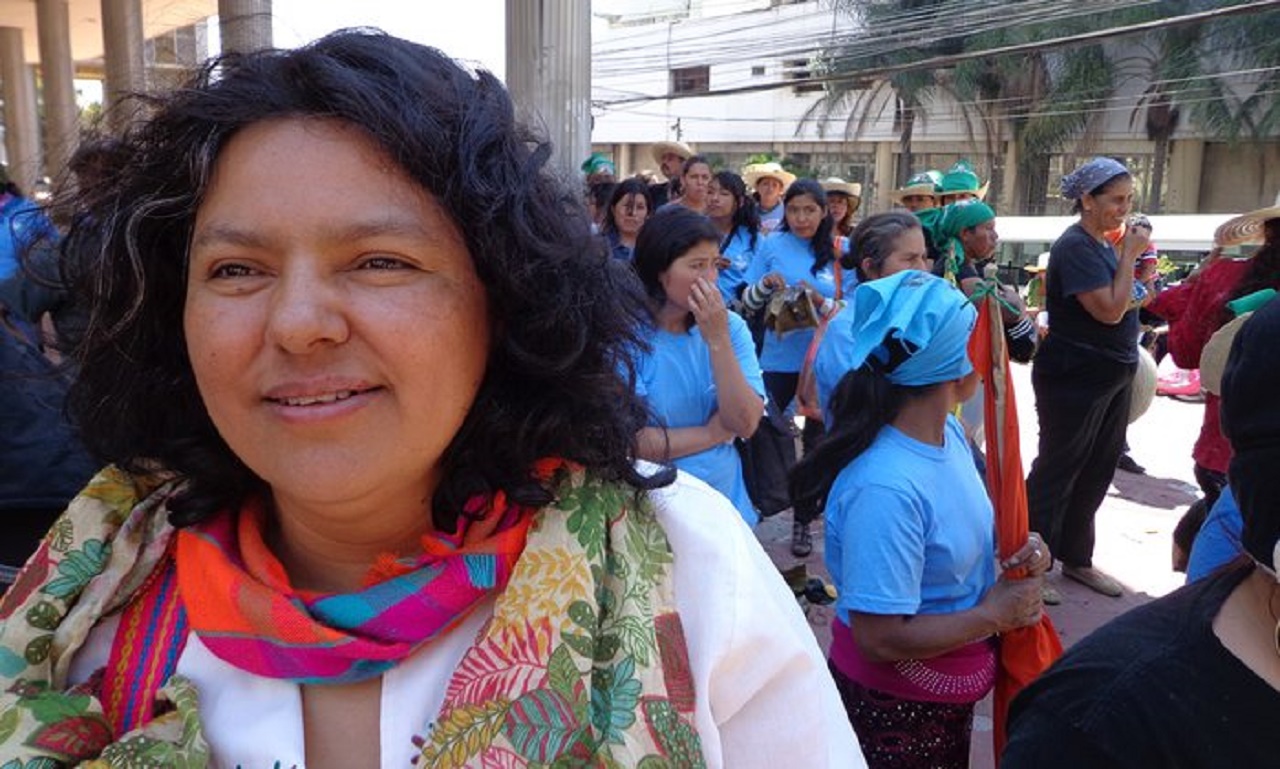El comportamiento del régimen de Hernández es en muchos sentidos similar al de las dictaduras violentas que existieron en toda la región en el siglo XX – regímenes que se mantuvieron en el poder a través del terror
por José Luis Granados Ceja
TEGUCIGALPA, HONDURAS – Según un activista, el arresto el 3 de marzo de un ejecutivo comercial hondureño, por presuntamente orquestar el asesinato en 2016 de la reconocida ambientalista Berta Cáceres, no ha inspirado la confianza pública generalizada en la aplicación de la ley. Por el contrario, Karen Spring, coordinadora de la Red de Solidaridad Hondureña, dijo a MintPress News que el arresto, dos años después de la muerte de Cáceres, se ha debido principalmente al cinismo de la clase trabajadora y pobre del país centroamericano.
La sospecha que prevalece es que la medida tenía como objetivo reparar la maltratada reputación internacional del gobierno y apaciguar a los votantes enojados por las políticas corporativas del partido político en el poder, las acusaciones de fraude electoral y una represión cada vez más violenta contra los disidentes.
Una mujer indígena lenca, Cáceres ganó el prestigioso Premio Ambiental Goldman en 2015 por liderar una exitosa campaña popular para bloquear la construcción de una presa hidroeléctrica a lo largo de las orillas del río Gualcarque en el oeste de Honduras. Fue asesinada el 2 de marzo de 2016 por una banda de intrusos armados, lo que llevó a ocho arrestos. A principios de este mes, la policía arrestó a un noveno: Roberto David Castillo Mejía, presidente del constructor de represas, Desarrollos Energeticos, que se conoce con el acrónimo DESA.
Un vocero del Ministerio Público hondureño dijo a Reuters que Castillo “estaba a cargo de proporcionar logística y otros recursos a uno de los perpetradores ya procesados por el crimen”. A través de intermediarios, Castillo ha negado cualquier participación en el asesinato.
Pero Spring, que había trabajado estrechamente con Cáceres desde que se mudó a Honduras desde Canadá en 2009, dijo que la participación de Castillo ha sido un secreto a voces. Los grupos que exigían justicia para Cáceres habían mantenido durante mucho tiempo que él era el autor intelectual detrás de su asesinato y pidieron su arresto. De hecho, la propia Cáceres había denunciado públicamente a Castillo en varias ocasiones, acusándolo de hostigamiento y amenazas.
“Creo que el estado ha sabido por mucho tiempo que David Castillo ha sido uno de los autores intelectuales de su asesinato”, dijo Spring a MintPress.
Desde el golpe de 2009, sucesivos gobiernos hondureños han sido sometidos a un intenso escrutinio por presuntas violaciones de los derechos humanos; Mientras tanto, el crimen violento se ha disparado, convirtiendo al país en uno de los más peligrosos del mundo.
Spring cree que el arresto de Castillo en relación con el asesinato de Cáceres fue solo el resultado de una intensa presión nacional e internacional y que no debe verse como una señal de que el gobierno de Hernández está interesado en mejorar su historial de derechos humanos.
Thousands of Honduras took to the streets to demonstrate against Hernandez’s disputed reelection. During those protests, eyewitnesses reported the use of live ammunition by state security forces against demonstrations. Human rights defenders allege that at least 38 people were killed by the Honduran police and armed forces in the weeks following the vote.
“In all those cases, the state hasn’t even lifted a finger,” stated Spring.
Meanwhile, dozens of pro-democracy activists and demonstrators have been detained.
Spring added:
“When you look at the lack of investigation into those 38-plus murders by state security forces and you look at the political will of the Honduran state to go after the 27 political prisoners who were jailed as a result of their involvement in the protests, it becomes very obvious that, in Honduras, the state lacks the will to really apply the rule of law.”
Both the U.S. and Canadian governments have justified sending millions of dollars in international aid into Honduras on the grounds that the country needs these funds to bring down the levels of violent crime and build a transparent justice system.
Spring contends that the U.S. and Canadian governments are not supporting human rights or the Honduran people at all, but instead are trying to advance their countries’ economic and geopolitical interests.
Both have long-running interests in Honduras. Many mining companies headquartered in Canada have operations in Honduras and the U.S. has long used the country as a staging point in its efforts to dominate the region. It thus follows that both were quick to legitimize the highly disputed presidential election.
“I think the only reason this government is in power is because of the U.S. government support,” argued Spring.
The Hernandez regime’s reliance on support from foreign governments serves, however, to further undermine its legitimacy inside the country and in the region.
The Honduran government finds itself mired in perpetual crisis and in an unstable situation.
It seeks greater legitimacy in the international community by moving to arrest a suspect in the murder of a prominent activist, but simultaneously it continues to detain a pro-democracy activist on spurious charges.
The arrest of David Castillo in connection to the murder of Berta Caceres was indeed due partially to the international pressure exerted on the government, a clear indication that solidarity can make an impact.



